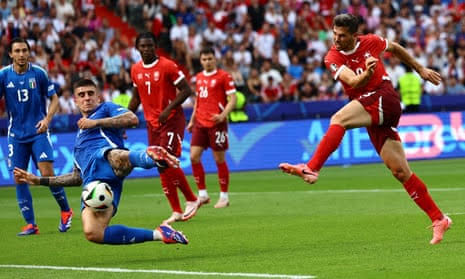The Olympiastadion in Berlin was the scene of a seismic shock on Saturday evening as Switzerland ousted the reigning champions, Italy, with a 2-0 victory in the Euro 2024 round of 16.
This result not only knocked the Azzurri out of the tournament but also ended their reign as European champions.
Here are the five key takeaways from a match that will be discussed for years to come.
1. Swiss Dominance in All Areas
From the first whistle, Switzerland exhibited a tactical discipline and intensity that Italy struggled to match. The Swiss were relentless in their pursuit of goals, registering 16 attempts compared to Italy’s paltry four, of which only one was on target.
Remo Freuler and Ruben Vargas found the net on either side of halftime, but the gulf in performance was evident throughout.
The Swiss pressed high, won key battles in midfield, and exploited Italy’s defensive frailties with clinical precision.
2. Remo Freuler: The Midfield Maestro
Remo Freuler’s performance was the highlight of the evening. His first goal was a masterclass in timing and technique.
In the 37th minute, Dan Ndoye’s intelligent movement created space for Vargas, who delivered a pinpoint cross. Freuler’s touch with his right foot set up a perfect left-footed strike, which deflected off Gianluca Mancini to wrong-foot Gianluigi Donnarumma.
Freuler was everywhere, intercepting passes, distributing the ball efficiently, and making late runs into the box as he bossed the Italians with his all-around midfield display.
3. Italian Struggles and Tactical Missteps
Italy’s performance was characterized by a lack of creativity and cohesion. Despite Luciano Spalletti’s decision to freshen the squad with several changes from the draw against Croatia, the team looked disjointed and sluggish.
The heat in Berlin, with temperatures nearing 30 degrees, might have played a part, but Italy’s inability to adapt tactically was glaring.
Federico Chiesa tried to inject some dynamism, but his efforts were in vain as Italy’s attacking play lacked the sharpness needed to break down a resolute Swiss defence.
4. Swiss Front Three Shine Bright
Ruben Vargas, Breel Embolo, and Dan Ndoye formed a potent attacking trio for Switzerland. Embolo’s tireless running and physicality caused constant problems for the Italian backline, while Vargas’s pace and precision were instrumental.
Vargas’s stunning goal just 30 seconds into the second half sealed Italy’s fate. Receiving the ball on the edge of the box, he unleashed a curling effort into the top corner, leaving Donnarumma with no chance and sending the Swiss fans into raptures.
5. Defensive Solidity and Game Management
Switzerland’s defensive display was exemplary. Manuel Akanji and Fabian Schär were rock-solid at the back, effectively nullifying Italy’s attacking threats.
Even when Italy managed to find some rhythm, Switzerland’s defensive organization held firm. A crucial moment came in the 52nd minute when Schär’s inadvertent header hit his own post, but luck favoured the Swiss as the ball bounced clear.
From there, Switzerland expertly managed the game, soaking up pressure and countering effectively when opportunities arose.The Olympiastadion in Berlin was the scene of a seismic shock on Saturday evening as Switzerland ousted the reigning champions, Italy, with a 2-0 victory in the Euro 2024 round of 16.
This result not only knocked the Azzurri out of the tournament but also ended their reign as European champions.
Here are the five key takeaways from a match that will be discussed for years to come.
1. Swiss Dominance in All Areas
From the first whistle, Switzerland exhibited a tactical discipline and intensity that Italy struggled to match. The Swiss were relentless in their pursuit of goals, registering 16 attempts compared to Italy’s paltry four, of which only one was on target.
Remo Freuler and Ruben Vargas found the net on either side of halftime, but the gulf in performance was evident throughout.
The Swiss pressed high, won key battles in midfield, and exploited Italy’s defensive frailties with clinical precision.
2. Remo Freuler: The Midfield Maestro
Remo Freuler’s performance was the highlight of the evening. His first goal was a masterclass in timing and technique.
In the 37th minute, Dan Ndoye’s intelligent movement created space for Vargas, who delivered a pinpoint cross. Freuler’s touch with his right foot set up a perfect left-footed strike, which deflected off Gianluca Mancini to wrong-foot Gianluigi Donnarumma.
Freuler was everywhere, intercepting passes, distributing the ball efficiently, and making late runs into the box as he bossed the Italians with his all-around midfield display.
3. Italian Struggles and Tactical Missteps
Italy’s performance was characterized by a lack of creativity and cohesion. Despite Luciano Spalletti’s decision to freshen the squad with several changes from the draw against Croatia, the team looked disjointed and sluggish.
The heat in Berlin, with temperatures nearing 30 degrees, might have played a part, but Italy’s inability to adapt tactically was glaring.
Federico Chiesa tried to inject some dynamism, but his efforts were in vain as Italy’s attacking play lacked the sharpness needed to break down a resolute Swiss defence.
4. Swiss Front Three Shine Bright
Ruben Vargas, Breel Embolo, and Dan Ndoye formed a potent attacking trio for Switzerland. Embolo’s tireless running and physicality caused constant problems for the Italian backline, while Vargas’s pace and precision were instrumental.
Vargas’s stunning goal just 30 seconds into the second half sealed Italy’s fate. Receiving the ball on the edge of the box, he unleashed a curling effort into the top corner, leaving Donnarumma with no chance and sending the Swiss fans into raptures.
5. Defensive Solidity and Game Management
Switzerland’s defensive display was exemplary. Manuel Akanji and Fabian Schär were rock-solid at the back, effectively nullifying Italy’s attacking threats.
Even when Italy managed to find some rhythm, Switzerland’s defensive organization held firm. A crucial moment came in the 52nd minute when Schär’s inadvertent header hit his own post, but luck favoured the Swiss as the ball bounced clear.
From there, Switzerland expertly managed the game, soaking up pressure and countering effectively when opportunities arose.
This result not only knocked the Azzurri out of the tournament but also ended their reign as European champions.
Here are the five key takeaways from a match that will be discussed for years to come.
1. Swiss Dominance in All Areas
From the first whistle, Switzerland exhibited a tactical discipline and intensity that Italy struggled to match. The Swiss were relentless in their pursuit of goals, registering 16 attempts compared to Italy’s paltry four, of which only one was on target.
Remo Freuler and Ruben Vargas found the net on either side of halftime, but the gulf in performance was evident throughout.
The Swiss pressed high, won key battles in midfield, and exploited Italy’s defensive frailties with clinical precision.
2. Remo Freuler: The Midfield Maestro
Remo Freuler’s performance was the highlight of the evening. His first goal was a masterclass in timing and technique.
In the 37th minute, Dan Ndoye’s intelligent movement created space for Vargas, who delivered a pinpoint cross. Freuler’s touch with his right foot set up a perfect left-footed strike, which deflected off Gianluca Mancini to wrong-foot Gianluigi Donnarumma.
Freuler was everywhere, intercepting passes, distributing the ball efficiently, and making late runs into the box as he bossed the Italians with his all-around midfield display.
3. Italian Struggles and Tactical Missteps
Italy’s performance was characterized by a lack of creativity and cohesion. Despite Luciano Spalletti’s decision to freshen the squad with several changes from the draw against Croatia, the team looked disjointed and sluggish.
The heat in Berlin, with temperatures nearing 30 degrees, might have played a part, but Italy’s inability to adapt tactically was glaring.
Federico Chiesa tried to inject some dynamism, but his efforts were in vain as Italy’s attacking play lacked the sharpness needed to break down a resolute Swiss defence.
4. Swiss Front Three Shine Bright
Ruben Vargas, Breel Embolo, and Dan Ndoye formed a potent attacking trio for Switzerland. Embolo’s tireless running and physicality caused constant problems for the Italian backline, while Vargas’s pace and precision were instrumental.
Vargas’s stunning goal just 30 seconds into the second half sealed Italy’s fate. Receiving the ball on the edge of the box, he unleashed a curling effort into the top corner, leaving Donnarumma with no chance and sending the Swiss fans into raptures.
5. Defensive Solidity and Game Management
Switzerland’s defensive display was exemplary. Manuel Akanji and Fabian Schär were rock-solid at the back, effectively nullifying Italy’s attacking threats.
Even when Italy managed to find some rhythm, Switzerland’s defensive organization held firm. A crucial moment came in the 52nd minute when Schär’s inadvertent header hit his own post, but luck favoured the Swiss as the ball bounced clear.
From there, Switzerland expertly managed the game, soaking up pressure and countering effectively when opportunities arose.The Olympiastadion in Berlin was the scene of a seismic shock on Saturday evening as Switzerland ousted the reigning champions, Italy, with a 2-0 victory in the Euro 2024 round of 16.
This result not only knocked the Azzurri out of the tournament but also ended their reign as European champions.
Here are the five key takeaways from a match that will be discussed for years to come.
1. Swiss Dominance in All Areas
From the first whistle, Switzerland exhibited a tactical discipline and intensity that Italy struggled to match. The Swiss were relentless in their pursuit of goals, registering 16 attempts compared to Italy’s paltry four, of which only one was on target.
Remo Freuler and Ruben Vargas found the net on either side of halftime, but the gulf in performance was evident throughout.
The Swiss pressed high, won key battles in midfield, and exploited Italy’s defensive frailties with clinical precision.
2. Remo Freuler: The Midfield Maestro
Remo Freuler’s performance was the highlight of the evening. His first goal was a masterclass in timing and technique.
In the 37th minute, Dan Ndoye’s intelligent movement created space for Vargas, who delivered a pinpoint cross. Freuler’s touch with his right foot set up a perfect left-footed strike, which deflected off Gianluca Mancini to wrong-foot Gianluigi Donnarumma.
Freuler was everywhere, intercepting passes, distributing the ball efficiently, and making late runs into the box as he bossed the Italians with his all-around midfield display.
3. Italian Struggles and Tactical Missteps
Italy’s performance was characterized by a lack of creativity and cohesion. Despite Luciano Spalletti’s decision to freshen the squad with several changes from the draw against Croatia, the team looked disjointed and sluggish.
The heat in Berlin, with temperatures nearing 30 degrees, might have played a part, but Italy’s inability to adapt tactically was glaring.
Federico Chiesa tried to inject some dynamism, but his efforts were in vain as Italy’s attacking play lacked the sharpness needed to break down a resolute Swiss defence.
4. Swiss Front Three Shine Bright
Ruben Vargas, Breel Embolo, and Dan Ndoye formed a potent attacking trio for Switzerland. Embolo’s tireless running and physicality caused constant problems for the Italian backline, while Vargas’s pace and precision were instrumental.
Vargas’s stunning goal just 30 seconds into the second half sealed Italy’s fate. Receiving the ball on the edge of the box, he unleashed a curling effort into the top corner, leaving Donnarumma with no chance and sending the Swiss fans into raptures.
5. Defensive Solidity and Game Management
Switzerland’s defensive display was exemplary. Manuel Akanji and Fabian Schär were rock-solid at the back, effectively nullifying Italy’s attacking threats.
Even when Italy managed to find some rhythm, Switzerland’s defensive organization held firm. A crucial moment came in the 52nd minute when Schär’s inadvertent header hit his own post, but luck favoured the Swiss as the ball bounced clear.
From there, Switzerland expertly managed the game, soaking up pressure and countering effectively when opportunities arose.



















